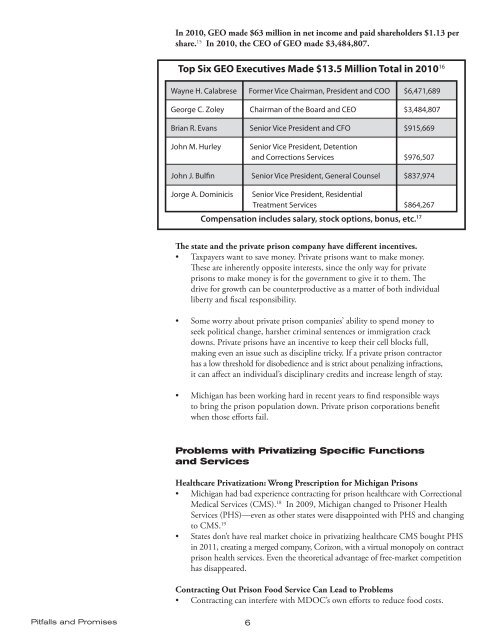Pitfalls and Promises - Michigan Corrections Organization
Pitfalls and Promises - Michigan Corrections Organization
Pitfalls and Promises - Michigan Corrections Organization
Create successful ePaper yourself
Turn your PDF publications into a flip-book with our unique Google optimized e-Paper software.
In 2010, GEO made $63 million in net income <strong>and</strong> paid shareholders $1.13 pershare. 15 In 2010, the CEO of GEO made $3,484,807.Top Six GEO Executives Made $13.5 Million Total in 2010 16Wayne H. Calabrese Former Vice Chairman, President <strong>and</strong> COO $6,471,689George C. Zoley Chairman of the Board <strong>and</strong> CEO $3,484,807Brian R. Evans Senior Vice President <strong>and</strong> CFO $915,669John M. HurleySenior Vice President, Detention<strong>and</strong> <strong>Corrections</strong> Services $976,507John J. Bulfin Senior Vice President, General Counsel $837,974Jorge A. Dominicis Senior Vice President, ResidentialTreatment Services $864,267Compensation includes salary, stock options, bonus, etc. 17The state <strong>and</strong> the private prison company have different incentives.• Taxpayers want to save money. Private prisons want to make money.These are inherently opposite interests, since the only way for privateprisons to make money is for the government to give it to them. Thedrive for growth can be counterproductive as a matter of both individualliberty <strong>and</strong> fiscal responsibility.• Some worry about private prison companies’ ability to spend money toseek political change, harsher criminal sentences or immigration crackdowns. Private prisons have an incentive to keep their cell blocks full,making even an issue such as discipline tricky. If a private prison contractorhas a low threshold for disobedience <strong>and</strong> is strict about penalizing infractions,it can affect an individual’s disciplinary credits <strong>and</strong> increase length of stay.• <strong>Michigan</strong> has been working hard in recent years to find responsible waysto bring the prison population down. Private prison corporations benefitwhen those efforts fail.Problems with Privatizing Specific Functions<strong>and</strong> ServicesHealthcare Privatization: Wrong Prescription for <strong>Michigan</strong> Prisons• <strong>Michigan</strong> had bad experience contracting for prison healthcare with CorrectionalMedical Services (CMS). 18 In 2009, <strong>Michigan</strong> changed to Prisoner HealthServices (PHS)—even as other states were disappointed with PHS <strong>and</strong> changingto CMS. 19• States don’t have real market choice in privatizing healthcare CMS bought PHSin 2011, creating a merged company, Corizon, with a virtual monopoly on contractprison health services. Even the theoretical advantage of free-market competitionhas disappeared.Contracting Out Prison Food Service Can Lead to Problems• Contracting can interfere with MDOC’s own efforts to reduce food costs.<strong>Pitfalls</strong> <strong>and</strong> <strong>Promises</strong> 6












